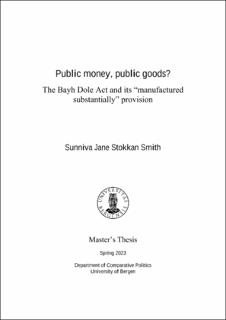Public money, public goods? The Bayh Dole Act and its “manufactured substantially” provision
Master thesis
Permanent lenke
https://hdl.handle.net/11250/3081868Utgivelsesdato
2023-06-02Metadata
Vis full innførselSamlinger
- Master theses [113]
Sammendrag
The Bayh-Dole Act of 1980 allows private institutions and small businesses to patent the results of federally funded research. One of the goals of the Act is to promote the commercialization and public availability of inventions made in the United States by United States industry and labor. This is to be realized through section 204 of the Act, which requires recipients of federal research funding to manufacture any products of that research in the US. Despite the importance of section 204, there is currently no research, peer-reviewed or otherwise, that evaluates its effects on domestic manufacturing. This thesis attempts to close this research gap by investigating and evaluating the Act’s 204 provision’s effect on the domestic manufacture of pharmaceuticals created with federal funding from the National Institutes of Health. This thesis attempts to explain the Act’s mechanisms of causality. It does so by presenting and discussing the causal mechanisms that proponents of the Act put forward in hearings held prior to enactment. Through original research, it investigates the impact of section 204 on the domestic manufacture of pharmaceuticals created with federal funding. By employing the method of process tracing, I detective-like searched for empirical data for the only theorized causal mechanism of the 204 provision found in hearings prior to 1980. This led to the creation of an original dataset on the manufacture of NIH-funded pharmaceuticals created between 1982 and 2007. The method of process tracing revealed several issues in the provision, but most importantly the lack of available, transparent data that allows for the true measurement of the 204 provision. The dataset results show that only ten out of ninety drugs created between 1982 and 2007 are subject inventions and thus subjected to the 204 provision. Process-tracing results show that only four were fully domestically manufactured in the U.S. Five were deemed inconclusive due to data. The research results tell us that there is a possible causal mechanism between the 204 provision and the domestic manufacture of federally funded research, with the policy effect being inconclusive due to data. Further, by comparing the different interpretations and implementations of the 204 provision between federal agencies show that 204 implementation is largely a choice by the federal agency. The investigation and subsequent evaluation of the 204 provision allow for a broader discussion of whether the Bayh-Dole Act still serves its intended purpose.
